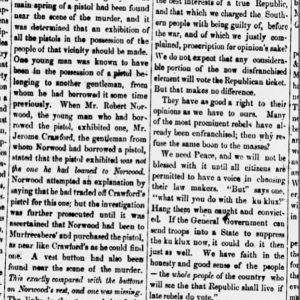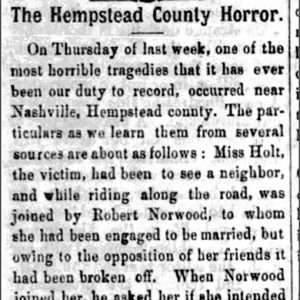calsfoundation@cals.org
Robert Norwood (Lynching of)
On December 13, 1871, the lifeless body of Mollie Holt was found in the Pine Grove neighborhood near Nashville (Howard County). Four days later, her former fiancé, Robert Norwood, was lynched for the crime. Reports from the time placed the events in Hempstead County, but in 1873, Howard County was created from portions of Hempstead, including the sites where the murder and lynching took place.
Holt was the youngest daughter of the late Jesse Holt, described as “an old and highly esteemed citizen of that neighborhood.” Norwood, meanwhile, was described as “of respectable family,” having “been generally regarded heretofore, as a worthy and deserving young man.”
According to the Washington Telegraph, Mollie Holt’s body “was most horribly mangled, having been shot through, two of her fingers badly chewed or shot, the head badly bruised and the brains having been beaten out with a bludgeon of some kind, believed to have been the but [sic] of a pistol.” Rumors apparently spread that she had been raped, but a postmortem examination disproved this. By the next morning, some 150 people were engaged in a search for the perpetrator. Suspicion initially centered upon an unnamed “negro boy, who had been living at Mrs. Holt’s for some time previous,” but despite reportedly telling “several contradictory stories about the matter” and behaving “in such a way generally as to create very strong reasons for believing him guilty”—perhaps due to a fear of being lynched himself—he was soon proven not guilty.
The locals devised a means of finding the guilty party. The main spring of a pistol had been discovered at the murder site, and so “it was determined that an exhibition of all the pistols in the possession of the people of that vicinity should be made.” One young man, Robert Norwood, was known to have borrowed a pistol from Jerome Crawford, but upon display of the item, Crawford stated that the pistol was not his. As the newspaper reported, those carrying out the investigation determined that Norwood had recently traveled to Murfreesboro (Pike County) “and purchased the pistol, as near like Crawford’s as he could find one.” In addition, Norwood’s vest was found to be missing a button exactly like one found at the murder site, and the man “abandoned his attempted deception, and voluntarily confessed that he was the sole author of the nameless crime.”
Norwood reportedly wrote out a full confession in which he stated that “a matrimonial engagement” had existed between Mollie Holt and him but that her family opposed the union, and she would not marry him “contrary to the wishes of her relatives.” A report in the Southern Standard of Arkadelphia (Clark County) held that she had broken the engagement. On the day of the murder, he was waiting by the roadside for her to pass by. Either she outright refused to marry him or suggested that they might be able to marry in the fall. In response, he shot her multiple times, beat her head, and then slashed her throat; upon the later discovery of the body, Norwood “went with the grief-stricken mother, and wept, with the family, over the ruin he himself had wrought.”
On the morning of Sunday, December 17, some 100–150 armed men came to the place (not specified) where Norwood was being held under guard and “took the now desperate man to a convenient limb, and there hung him by the neck until he was dead, dead, dead,” according to the Washington Telegraph.
For additional information:
“The Hempstead County Horror.” Southern Standard (Arkadelphia, Arkansas), December 23, 1871, p. 2.
“Horrible Tragedy.” Washington Telegraph (Arkansas), December 20, 1871, p. 2.
“State News.” Arkansas Gazette, December 24, 1871, p. 1.
Staff of the CALS Encyclopedia of Arkansas
 Civil War through Reconstruction, 1861 through 1874
Civil War through Reconstruction, 1861 through 1874 Law
Law Robert Norwood Lynching Article
Robert Norwood Lynching Article  Robert Norwood Lynching Article
Robert Norwood Lynching Article 



Comments
No comments on this entry yet.